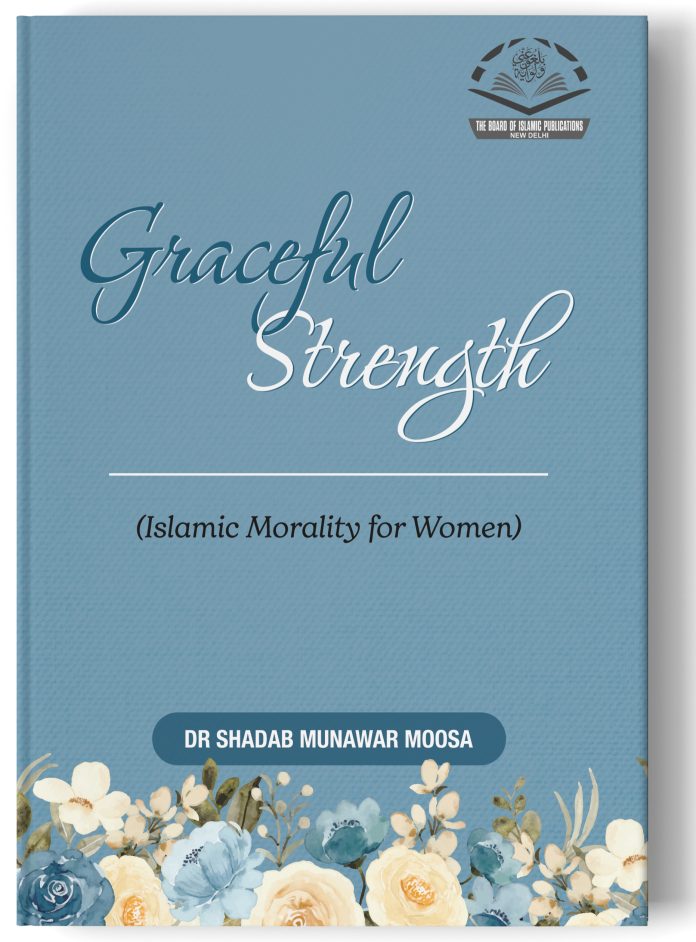Book: Graceful Strength: Islamic Morality for Women
Author: Dr. Shadab Munawar Moosa
Publisher: The Board of Islamic Publications
Year: 2024
Price: Rs. 200
Reviewed by Sikandar Azam
Morality is the nucleus of human life. This is the salient feature that distinguishes man from other living beings. But, unfortunately, the human society in the postmodern world has lost this sheen. The lopsided growth of science and technology, the rise of atheism and Godlessness in human society, and utter indifference to the sense of accountability are some of the factors that have contributed a lot to this phenomenon. However, concerned writers have felt the pain of this loss and tried their level best to revive the role of ethics in human life. They have written a number of books on the subject. Dr. Shadab Munawar Moosa’s Graceful Strength: Islamic Morality for Women is the latest addition to this genre of publication.
A.A. Khan’s Morality and Ethics in Islamic Culture, and Unal Ali’s Living the Ethics and Morality of Islam are general in approach to the role of Islamic ethics in human life. While Dr. Shadab’s Graceful Strength concentrates on morality for Muslim women. This target readership makes the book very comprehensive on the subject.
The book is divided in 15 chapters. The 1st chapter introduces morality in Islam. In the 2nd chapter, the author traces the threads of Islamic morality in historical perspective, culling thoughts from theological giants like Imam Bukhari, Imam Ghazali and Ibn Taymiyyah. He also discusses how Islamic moral thought evolved with the contributions of Islamic thinkers like Imam Razi, Al-Farabi, Ashraf Ali Thanvi and Abul A’la Maududi, etc.
The 3rd chapter deals with the core values of Islamic morality like honesty, compassion, modesty, justice and gratitude. The 4th chapter explores women’s role in promoting Islamic morality and the challenges they face in this pursuit.
The 5th chapter gives an overview of postmodern sexual revolution. The 6th chapter details the negative impacts of postmodern sexual revolution on Indian moral landscape, including erosion of traditional morality, rise in casual relationships, mental health issues, cultural and generational conflicts.
The 7th chapter presents a critique of postmodern sexual revolution from Islamic point of view while the 8th chapter engages the readers with a comparison of Feminism and Islamic morality and guides them to the true empowerment of women. The 9th chapter deals with the allure of western feminist ideals while the 10th chapter presents the dark side of feminist self-help – how it is harming women and eroding Islamic principles.
The 11th chapter elucidates how Islamophobia is affecting Muslim women’s morality and dignity, while the 12th chapter elaborates on the Muslim female experience in the wake of Hindutva propaganda.
The 13th chapter provides Action Guide on how Muslim women can transform Indian female morality paradigm, while the 14th chapter expounds Muslim female role models. The 15th and last chapter illuminates the future of morality for Muslim women – how they can face challenges with resilience and embrace the future with hope and determination.
The Foreword by Dr. Javed Jamil, Chair in Islamic Studies and Research, Mangaluru, Yenepoya University, Karnataka, and author of over a dozen books, including The Devil of Economic Fundamentalism, and The Killer Sex, etc. further lends worth to the book.
Though the book refers largely to Islamic sources like the Quran, Hadith and Islamic thinkers, and cites some global Muslim women whose contributions have turned the society for the better, Dr. Shadab’s book can be of immense interest for the reading public from diverse faiths as well; for it can serve as a good source material for comparative study.




